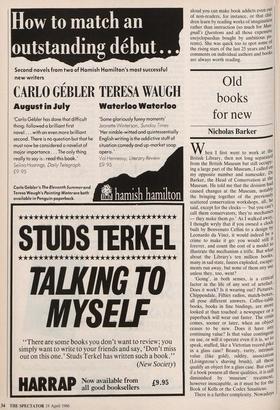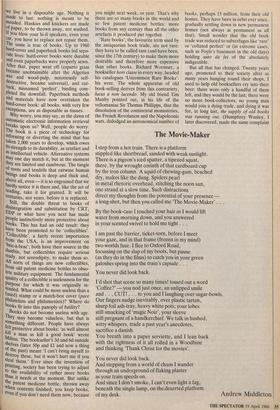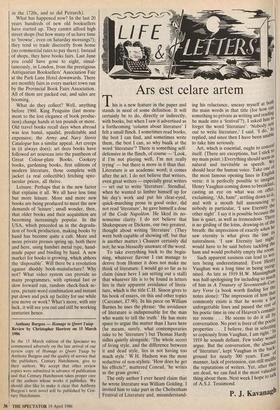Old books for new
Nicholas Barker
When I first went to work at the British Library, then not long separated from the British Museum but still occupy- ing a large part of the Museum, I called on my opposite number and namesake, Dr Barker, the Head of Conservation at the Museum. He told me that the division had caused changes at the Museum, notablY the bringing together of the previously scattered conservation workshops, all, he said, except for the clocks — 'but you can t call them conservators, they're mechanics — they make them go.' As I walked away. I thought wryly that if you owned a clock built by Benvenuto Cellini to a design by Leonardo da Vinci, it would indeed be crime to make it go: you would still it forever, and count the cost of a model to illustrate the mechanism a trifle. But what about the Library's ten million books, many in sad state, fusees exploded, escape- ments run away, but none of them any use unless they, too, went? 'Going', in both senses, is a critical factor in the life of any sort of artefact. Does it work? Is it wearing out? Pictures, Chippendale, Fifties radios, match-boxes, all pose different answers. Coffee-table books, books in fine bindings, are more looked at than touched: a newspaper or a paperback will wear out faster. The crisis comes, sooner or later, when an object ceases to be new. Does it have anY continuing value? Is that value contingent on use, or will it operate even if it is, so to speak, stuffed, like a Victorian record pike in a glass case? Beauty, rarity, intrinsic value (like gold), oddity, association (Livingstone's shaving brush), all these qualify an object for a glass case. But even if a book possess all these qualities, it is still diminished by 'museum' treatment, however inescapable, as it must be for the Book of Kells or the Codex Sinaiticus.
There is a further complexity. Nowadays we live in a disposable age. Nothing is made to last: nothing is meant to be mended. Hankies and knickers are made of paper, to be thrown away, not washed. If you blow your hi-fi speakers, even your car, you have to replace not repair them. The same is true of books. Up to 1960 hard-cover and paperback books led sepa- rate lives: hard-cover books were durable and even paperbacks were properly sewn. After that, paper went off (esparto grass became unobtainable after the Algerian war and wood-pulp, notoriously self- destructive, became universal), and cut- back, misnamed 'perfect', binding com- pleted the downfall. Paperback methods and materials have now overtaken the hard-cover book: all books, with very few exceptions, are as disposable as tissues. Why worry, you may say, as the dawn of automatic electronic information retrieval breaks upon us? Well, people do worry. The book is a piece of technology for Informing or diverting the mind that has taken 2,000 years to develop, which owes Its strength to its durability, as artefact and as intellectual vehicle. Alternative systems May one day match it, but at the moment they are limited and cumbrous. The tangle of roots and tendrils that entwine human beings and books is deep and thick and, above all even — it is so engrained that we hardly notice it is there and, like the act of reading, take it for granted. It will be Centuries, not years, before it is replaced. Still, the double threat to books of disintegration and substitution by CRT, EDP or what have you next has made People instinctively more protective about books. This has had an odd result: they have been promoted to be 'collectibles'. Collectible', a fairly recent importation from the USA, is an improvement on bric-a-brac'; both have their source in the dustbin, but collectibles require serious study, not serendipity, to make them so. All sorts of things are now collectibles, from old patent medicine bottles to obso- lete military equipment. The fundamental quality of a collectible is uselessness for the Purpose for which it was originally in- tended. What could be more useless than a (used) stamp or a match-box cover (pace Philatelists and philumenists)? Where do books fit into this panoply of futility? Books do not become useless with age. They may become valueless, but that is something different. People have always felt protective about books: 'as well almost lull a man as kill a good book' wrote Milton. The bookseller's 3d and 6d outside shelves (later 50p and and now a thing of the past) meant 'I can't bring myself to destroy these, but it won't hurt me if you steal them.' Ever since the invention of Printing, society has been trying to adjust to the availability of rather more books than it needs at the moment. But unlike the patent medicine bottle, thrown away when contents finished, you keep books, even if you don't need them now, because you might next week, or year. That's why there are so many books in the world and so few patent medicine bottles: more books from any century than all the other artefacts it produced put together.
`Rare books', the favourite term used by the antiquarian book trade, are not rare: they have to be called rare (and have been, since the 17th century) to make them more desirable and therefore more expensive than other books. Richard Wormser, a bookseller hors classe in every way, headed his catalogues 'Uncommon Rare Books': his were. The whole apparatus of old book-selling derives from this contrariety, lucus a non lucendo. My old friend Tim Munby pointed out, in his life of the vellomaniac Sir Thomas Phillipps, that the dissolution of the continental monasteries, the French Revolution and the Napoleonic wars, dislodged an astronomical number of books, perhaps 15 million, from their old homes. They have been in orbit ever since, gradually settling down in new permanent homes (not always as permanent as all that). Small wonder that the old book trade was reduced to subterfuges like 'rare' or 'collated perfect' or (in extreme cases, such as Foyle's basement in the old days) holding auto da fes of the absolutely indigestible.
But all that has changed. Twenty years ago, promoted to their society after as many years hanging round their shops, I used to help old booksellers cry into their beer: there were only a handful of them left, and they would be the last; there were no more book-collectors; no young man would join a dying trade, and dying it was for, at long last, the supply of old books was running out. (Humphrey Wanley, I later discovered, made the same complaint
in the 1720s, and so did Petrarch).
What has happened now? In the last 20 years hundreds of new old booksellers have started up. They cannot afford high street shops (but how many of us have time to 'browse', even on Saturday mornings?); they tend to trade discreetly from home (no commercial rates to pay there). Instead of shops, they have books fairs. Last June you could have gone to eight, simul- taneously, in London, from the prestigious Antiquarian Booksellers' Association Fair at the Park Lane Hotel downwards. There are monthly fairs in every market town run by the Provincial Book Fairs Association. All of them are packed out, and sales are booming.
What do they collect? Well, anything before 1960. King Penguins (last monu- ment to the lost elegance of book produc- tion) change hands at ten pounds or more. Old travel books recall days when abroad was less banal, squalid, predictable and expensive; the Army and Navy Stores Catalogue has a similar appeal. Art creeps in (it always does); art deco books have followed art nouveau into the pantheon of Great Colour-plate Books. Cookery books, gardening books, first editions of modern literature, those complete with jacket (a real collectible) fetching spec- tacular prices, all thrive.
Leisure. Perhaps that is the new factor that explains it all. We all have less time but more leisure. More and more new books are being produced to meet the new demands of leisure'; small wonder, then, that older books and their acquisition are becoming increasingly popular. In the USA, which preceded us in the degrada- tion of book production, making books by hand has become quite a cult. More and more private presses spring up, both there and here, using handset metal type, hand- made paper and binding by hand. A new market for books is growing, which abhors the 'disposable'. Will there be a revolution against shoddy book-manufacture? Why not? What video system can provide so many programmes, with optional fast or slow forward run, random check-back ac- cess, picture-word combination and instant put down and pick up facility for use while you move or work? What's more, with any luck, it will see you out and still be working centuries hence.




















































 Previous page
Previous page